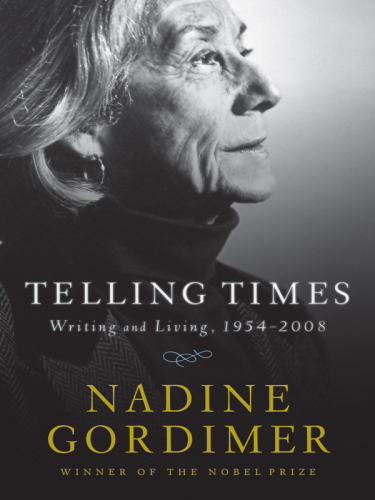
Telling Times
Writing and Living, 1954-2008
- اطلاعات
- نقد و بررسی
- دیدگاه کاربران
نقد و بررسی

April 26, 2010
Politics and literature intersect in this comprehensive—sometimes too comprehensive—collection of nonfiction writings by the Nobel Prize–winning South African novelist and antiapartheid activist. Covering five decades, these short pieces run the gamut: autobiographical sketches; chiaroscuroed travelogues that wander from the Congo to Cairo; literary essays on novelists from Tolstoy to Chinua Achebe and Philip Roth; profiles of Nelson Mandela and Archbishop Desmond Tutu; op-eds on issues like AIDS and water shortages; the odd dispatch from the Cannes film festival and a retrospective on the 20th century. At the vital core of the volume are Gordimer’s gripping reports from the battle against apartheid, in which she dissects the hypocrisy and brutality of South African racism and ponders her responsibility as a white liberal “minority within the minority.” The more polished of these pieces brim with subtle insights and evocative landscapes and characterizations. Others, culled from after-dinner speeches, letters, and other odds and ends, have a tossed-off feel; the tome is large enough to require and reward judicious browsing. At its best, Gordimer’s writing is both consummately artful and deeply engaged; she shows us that “the truth isn’t always beauty, but the hunger for it is.”

April 15, 2010
A massive collection of nonfiction by the South African Nobel Prize winner and longtime critic of apartheid.
This omnibus of essays by Gordimer (Beethoven Was One-Sixteenth Black, 2007, etc.) runs chronologically. Though it's only intermittently autobiographical, it begins with her early years: In"A South African Childhood," she describes growing up in comfort but never far from the mining industry that introduced her to her homeland's institutionalized racism. Gordimer addresses apartheid from several angles: as a literary critic, considering the works of black authors who were routinely banned by the state; as a dissident, protesting the racist policies that prompted jailings, violence and uprootings of communities; and as a keen social observer who took note of the intimate bonds that connected blacks and whites when they could meet away from the authorities' eyes. Her tone on the subject is stern, chastising, mournful, mocking and, once apartheid began to collapse in 1990, jubilant. But what consistently defines her prose is a fierce commitment to addressing the subject openly and in plain speech. Even after the end of apartheid she wrote thoughtfully on the steps that both blacks and whites needed to take to achieve social parity. Telling Times also includes Gordimer's essays on other topics, mainly literature and philosophy. She had a youthful affinity for French existentialists, and there are numerous close readings of fiction writers from South Africa (J.M. Coetzee, William Plomer), the Middle East and the United States. Away from political or literary concerns, though, the author has a more difficult time finding her footing. Her travel pieces on the Congo, Botswana and Madagascar are meandering and surprisingly unevocative for a writer who has imagined Africa so powerfully in her fiction. Though her political commitment persists, there's less force in her later work, mostly briefer articles of the op-ed and keynote-speech variety.
Nonetheless, a much-deserved tribute to Gordimer and a firm reminder of her country's difficult path to liberation.
(COPYRIGHT (2010) KIRKUS REVIEWS/NIELSEN BUSINESS MEDIA, INC. ALL RIGHTS RESERVED.)

June 1, 2010
Nobel laureate Gordimer believes that within the next century a printed book will be ignored as simply "a stone tablet," and she is "relieved to know" that she "won't be around" to witness this world. The reading and writing of books has been Gordimer's universe for nearly 80 years, and this collection of her nonfiction is a brilliant example of the power of the written word. This massive volume includes essays, letters, and speeches and reflects the continuing themes of her lifebeing a white South African, fighting apartheid, resisting censorship, and promoting writers and writing. Other essays explore the physical and material landscape of South Africa, such as the gold mining towns, African pots, and coal dumps, while her most recent work concerns the challenge of voter education, the effects of globalization, and the scourge of AIDS. VERDICT Pieces are grouped by the decade in which they were written and include the date of publication but not a complete bibliographic citationa disappointing omission. An introduction by the author would have been useful; however, Gordimer fans as well as readers interested in literature, literary criticism, and South Africa will still value this collection. [See Prepub Alert, "LJ" 2/1/10.]Kathryn R. Bartelt, Univ. of Evansville Libs., IN
Copyright 2010 Library Journal, LLC Used with permission.

April 1, 2010
In this landmark collection of Nobel laureate Gordimers assured and historic nonfictionnearly 100 essays spanning 60 yearsthe clarity of her voice and the deep impress of her observations make for high-voltage reading. The daughter of Jewish European immigrants to South Africa, Gordimer, born in 1923, has been a keen and candid, brilliant and artistic witness to her countrys struggle toward racial equality and justice. She writes beautifully of common humanity; chronicles the sacrifices of Nelson Mandela, Desmond Tutu, and scores of less-heralded heroes; and explores with great insight and passion the crucial symbiosis between politics and literature. As one of many banned authors, she condemns censorship and declares, All that a writer can do, as a writer, is to go on writing the truth as he sees it. Which she does in Letter from Soweto, a protest against the violent crushing of the 1976 black-student uprising; Living in the Interregnum, a clarion 1982 inquiry into the role of whites opposed to apartheid; the vivid and frank Five Years into Freedom, written in 1999; and into the 2000s, when Gordimer writes of AIDS, the water crisis, and, as always, the unkillable word. Gordimers sublimely literary nonfiction of conscience is at once personal and magisterial.(Reprinted with permission of Booklist, copyright 2010, American Library Association.)




دیدگاه کاربران